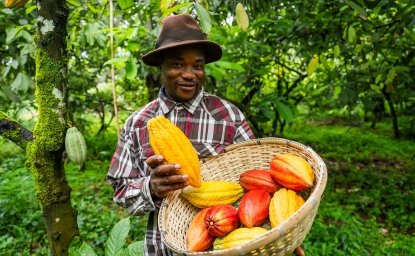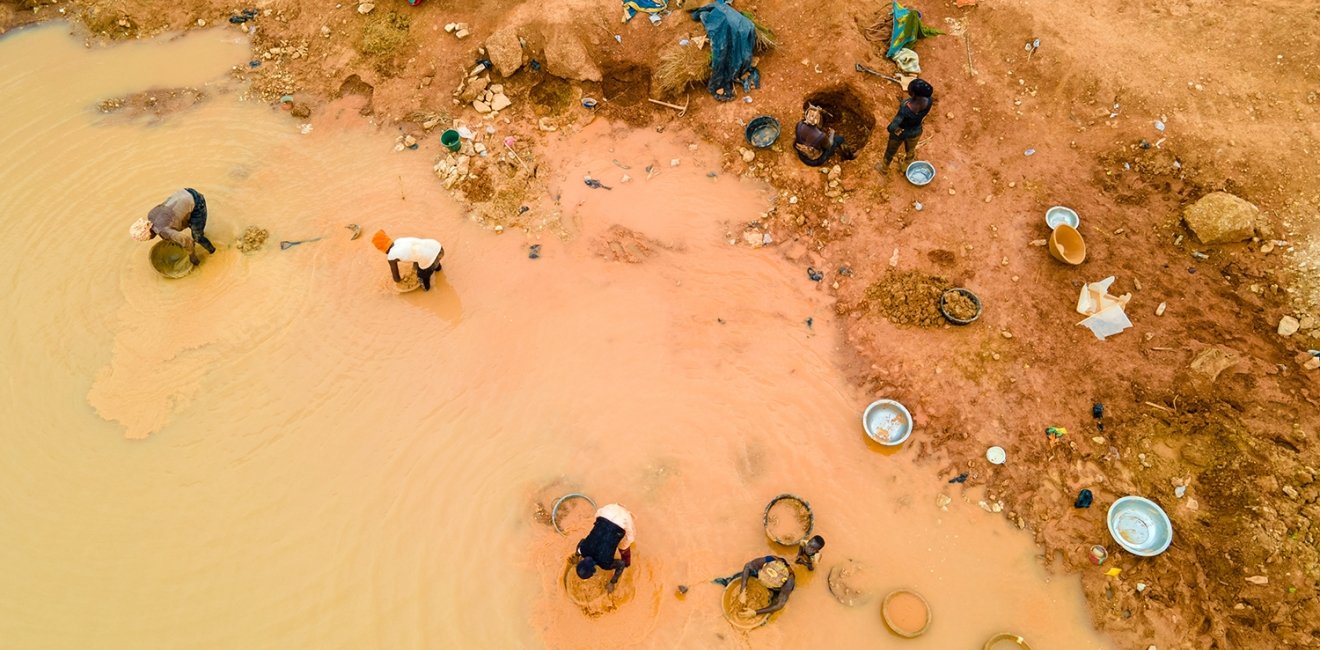
A blog of the Wilson Center
60% of Ghana’s fresh water sources are contaminated by toxins and chemicals from illegal gold mining.
For centuries Ghana was known to many as the Gold Coast. And for good reason: gold is a cornerstone of Ghana’s economy and history as far back as the 7th century, allowing ancient empires like the Ashanti to dominate regional trade and amass great wealth and power.
These days, the West African nation is still the largest gold producer on the continent and among the top 10 gold producing countries in the world. In 2023, gold accounted for nearly half of all Ghanaian exports. While much of Ghana’s gold is extracted by large companies like Gold Fields, Kinross Gold, Newmont, and AngloGold Ashanti, government licensed artisan and small-scale operations (ASMs) accounted for approximately 35% of the country’s total gold output in 2020. These ASMs supported the livelihoods of approximately 5 million people—or more than 10% of Ghana’s population. In fact, statistics compiled by Ghana’s Minerals Commission show that ASMs alone are on track to contribute $10 billion to the country’s exports by the end of 2024.
But not all gold mining is good gold mining… or safe, healthy, or beneficial to Ghana’s economic future. Illegal small-scale mining in Ghana, known as “galamsey” (taken from a slang phrase for “gather and sell”) is estimated to cost Ghana more than $2.3 billion each year in lost revenue and illegal smuggling. Worse yet, Ghanaians say galamsey is endangering people’s health and ruining farmland. As global gold prices rise (increasing approximately 30% this past year), these illegal operations are likely to increase dramatically.
Legal mining is heavily regulated in Ghana to ensure that environmental impacts are minimized and that tax revenues are used to advance the country’s national priorities—including investments in health, education, and economic development. As gold prices began rising sharply in 2023 when international investors viewed it as a hedge against rising inflation and economic uncertainty, miners from countries like Burkina Faso and Cote d'Ivoire (even from as far away as Russia, Armenia, and China) quickly moved into Ghana to launch new or expanded illegal mining operations.
The presence of unapproved foreign mining operations in Ghana isn’t a new phenomenon: since the early 2000s, more than 50,000 Chinese miners entered the country and brought advanced earth-moving technologies with them. In some cases, these galamsey operations are now crowding out legal ASM operators, who typically mine with basic tools like pickaxes and shovels. Recent figures estimate that there are currently 10,000 to 30,000 Chinese migrants living and operating in Ghana, incentivized by soaring gold prices to extract as much gold as they can—as quickly as they can do it.
The increase in illegal galamsey hasn’t merely taken revenue opportunities away from local businesses, communities, and the national economy, in many cases the methods employed by illegal galamsey miners are also exacting a heavy environmental cost. By one estimate, these operators have polluted 60% of Ghana’s fresh water sources with deadly toxins and chemicals. While legal ASM operators use techniques such as “panning”—washing sediments with a sieve so gold settles at the bottom—illegal operators often introduce mercury and cyanide to more easily find gold. According to USAID and local health officials, the Pra, Ankobra, Birim, and Offin rivers, which locals once relied on for their daily water needs, are now heavily contaminated with these deadly chemicals, chemicals that can linger in the environment for more than 1,000 years. Ghana’s state water utility recently raised alarms that at the current rate of environmental contamination, Ghana would need to import fresh water by 2030. In some cases, mercury, cyanide, and arsenic—elements often associated with galamsey practices—have even been found in the placentas of pregnant women, causing some babies to be born with severe birth defects.
In some parts of Ghana, galamsey operations are also threatening the future of community-based agriculture. Contaminated freshwater supplies are taking away the ability of many farmers to grow and sell their crops. Where galamsey operators use heavy equipment to clear large tracts of land for easier access to gold deposits, many nutrient- and shade-dependent crops, like cocoa—which accounts for almost 10% of Ghana’s exports—are significantly impacted. According to John Allotey, head of Ghana’s Forestry Commission, 34 out of 288 forest reserves have been impacted across 7 of the country’s 16 regions. It’s also estimated that more than 100,000 acres of cocoa farms have been destroyed through galamsey operations.

Ghanaians understand better than anyone the potential value of their mineral resources and what smart, supervised, and appropriately regulated mining can mean in terms of economic opportunity. And there are countless legal operators in Ghana, large and small, who are creating revenues and employment for a country that needs both. But there is growing recognition that galamsey and the unscrupulous operators it brings into Ghana from around the world are threatening the country’s health and wellbeing. Many are taking to the streets to protest what they see as the government’s failure to address galamsey’s negative effects. Some have even claimed that local politicians and businessmen are aiding and abetting the “mad gold rush,” turning a blind eye as traditional employers like cocoa farms are turned into illegal mining sites. They suspect that payoffs by galamsey miners have led officials to ignore the best interests of citizens—and the future.
Artisan and small mining operators can be good for community-based economic growth, and their environmental impact can be minimized by formalizing and including them in long term environmental planning. In Colombia, for example, a country with abundant mineral resources, USAID worked closely with the Duque government on a series of ASM projects it called “Oro Legal.” Oro Legal recognized that while unsupervised, illegal artisanal gold mining posed a threat to Colombia’s environment, done the right way, it could help provide economic security for citizens often left out of Colombia’s economic growth. The USAID-supported projects led to more than $194 million in legal gold sales and provided over half a million Colombians with family-supporting jobs. Revenues derived through the ASMs were also used to rehabilitate nearly 17,000 hectares of land that had been degraded by illegal mining. The government supervised ASMs nearly eliminated the use of mercury in gold production in areas covered by Oro Legal. USAID also made general recommendations to the artisanal mining industry in Ghana, and in partnership with Servir West Africa, monitors its increasing galamsey operations.
In modern times, as the world searches for ways to extract minerals—from timeless treasures like gold to contemporary treasures like lithium and cobalt—responsible governments are helping to manage their resources for the benefit of future generations. But as the situation in parts of Ghana shows, there are other forces and operators merely looking for a “quick buck”—no matter who has to suffer along the way.
This blog was researched and drafted with assistance from Chelsea Acheampong.
Author


Africa Program
The Africa Program works to address the most critical issues facing Africa and US-Africa relations, build mutually beneficial US-Africa relations, and enhance knowledge and understanding about Africa in the United States. The Program achieves its mission through in-depth research and analyses, public discussion, working groups, and briefings that bring together policymakers, practitioners, and subject matter experts to analyze and offer practical options for tackling key challenges in Africa and in US-Africa relations. Read more

Explore More in Stubborn Things
Browse Stubborn Things
Spying on Poachers

China and the Chocolate Factory

India: Economic Growth, Environmental Realities

